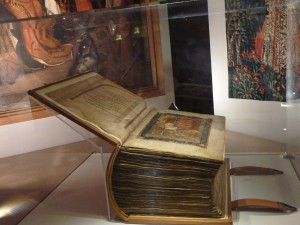A spectacular exhibition, ‘Travelling in the Middle Ages’, mounted in collaboration with museums in Florence, Catalonia and Cologne, is running in Musée de Cluny in Paris from 22 October 2014 to 23 February 2015 (http://www.musee-moyenage.fr/activites/expositions/expositions-en-cours-/exposition-voyager-au-moyen-age.html). The exhibition illustrates many aspects of travel in the Middle Ages, and different motivations for travel, such as pilgrimage, war, exploration and social aspirations. The choice of exhibits is highly imaginative and includes manuscripts, maps, fragments of a medieval boat, personal objects, such as clothing, trunks, amulets and portable candle holders, as well as tapestries, paintings and sculpture depicting travel. Among the objects on display are a signet ring of the Black Prince and a Viking Age memorial stone with an inscription in runes. Undoubtedly the most important exhibit from the point of view of an Anglo-Saxonist is the Codex Amiatinus (click on image below), an enormous Vulgate pandect made at Monkwearmouth-Jarrow under the direction of Abbot Ceofrith, now in the Biblioteca Medicea Laurenziana in Florence. This Bible known for exceptional quality of its text and execution is 250mm thick and weighs over 34kg.
Category Archives: Events
North of England Saints, 600-1500
21-22 March 2015, Lady Margaret Hall, Oxford
Following the feast day commemorating St Cuthbert’s death on 20 March, this two-day interdisciplinary conference aims to fill a strategic gap in our understanding of the wider implications of the medieval cults of saints and the lives and social importance of hermits and anchorites. The conference will bring together scholars working on the liturgical, political, military, social and economic aspects of sanctity in Durham, Northumbria, Cumbria, Yorkshire and modern-day Scotland.
http://www.lmh.ox.ac.uk/Tutors/Academic-news/Northern-Saints.aspx
TOEBI meeting, 18 Oct 2014
TOEBI aims to promote and support the teaching of Old English in British and Irish Universities, and to raise the profile of the Old English language, Old English literature and Anglo-Saxon England in the public eye.
The next TOEBI meeting will be held at the University of Nottingham on 18 October
2014. The TOEBI 2014 Programme and the TOEBI 2014 AGM Agenda are available.
Report: ‘From Eald to New: Translating Early Medieval Poetry for the 21 st Century’
‘Eald to New’ was hosted by the School of English, University College Cork, on June 5-7 2014 and organized by Tom Birkett and Kirsty March-Lyons. It consisted of three main events: a graduate workshop, a public poetry evening and a two-day conference. The event sought to bring together academics and creative practitioners working with Old English, Old Irish and Old Norse poetry, in order to encourage collaboration and advance our under-standing of the practical, theoretical and socio-cultural aspects of the translation process. It also addressed the pedagogical considerations of teaching translation and using translated texts such as Heaney’s Beowulf within the academy. The Irish Research Council, the Society for the Study of Medieval Languages and Literature, the School of English, University College Cork
and UCC’s Information Services Strategic Fund, as well as the Forum for Medieval and Renaissance Studies in Ireland, provided generous funding for the three day event.
The graduate workshop on creative translation was conducted by the editors of the The Word Exchange: Anglo-Saxon Poems in Translation – Greg Delanty and Michael Matto – and by Lahney Preston-Matto, the most recent translator of the Old Irish tale The Vision of Mac Conglinne. The workshop catered for students with varying levels of language competence and focused on creative use of the material. The conference was officially launched on the evening of the 5th June by a wine reception and public poetry evening held in the Lewis Glucksman Gallery. The poetry event comprised readings from ten local and internationally
renowned poets who have produced translations of medieval poetry, including several for The Word Exchange anthology. Leanne O’Sullivan, UCC’s writer in residence, compèred the event which was opened by Greg Delanty reading his translation of The Wanderer in full. The
evening was a rare opportunity to hear the poems performed by their translators, and
showcased the increasing accessibility and relevance of medieval poetry for a contemporary audience.
The conference itself served as a timely forum bringing together poets and academic translators to share their working practices and teaching methodologies, and this mixed audience led to lively discussions following each of the panels. The conference programme consisted of four plenary addresses and twenty-five papers given by established academics as well as early career scholars and graduate students. Over the course of the two days, around 100 people attended the conference, including a heartening number of undergraduate students. The keynote addresses were given by: Carolyne Larrington (University of Oxford), Heather O’Donoghue (University of Oxford), Chris Jones (University of St Andrews) and Hugh Magennis (Queen’s University Belfast). On the first day, the panels were dedicated to Old Norse and Old Irish translation; the final session also briefly ventured into Middle English verse and Provençal Troubadour poetry. The second day centered on the issues of translating Old English poetry and teaching through translation, and included papers on the translation of Old English into Spanish and Turkish, as well as featuring reports from ongoing translation initiatives, including the ‘Old English Poetry Project’ coordinated by Bob Hasenfratz and Miller Oberman.
The organizers plan to publish conference proceedings in the near future and more information about the aims and direction of ‘Eald to New’ can found at http://ealdtonew.org.
Tom Birkett and Kirsty March-Lyons
School of English, University College Cork
